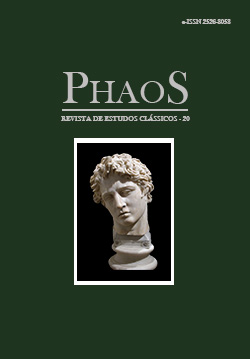Abstract
This paper aims to achieve a critical course about the elegiac genre since its origins to the Heroides of Ovid. Still in Antiquity, elegy was a genre attached to moan song, mostly funeral. However, when we analyze the elegies of the ancient Greeks and thoso of the Hellenistics, we can not find any composition strictly of moan, what will be seen in the poetry of the Latins starting from Catullus and Gallus. With the last one begins the erotic elegy, in which we find the amorous moan. Tibullus and Propertius take the genre to its ultimate consequences, so that in the last compositions love is no longer the central theme, and Ovid, in this sense, can only break off with the tradition, what in fact he does since the beginning of his poetic career. Thereby, the Heroides are a sample of the originality of the Sulmona poet, besides being his work, after the Metamorphoses, that had the biggest influence in the history of literature.
References
AA.VV. Elegy and Iambus. Ed. J. M. Edmonds. Cambridge, Mass.: Harvard University Press, 1961, 2 voll.
ACHCAR, Francisco. Lírica e lugar-comum. São Paulo: Edusp, 1994.
ALONI, Antonio. “Elegy”, in BUDELMAN, Felix. The Cambridge Companion to Greek Lyric. Cambridge: Cambridge University Press, 2009.
ARISTÓTELES. A poética clássica. Aristóteles, Horácio, Longino. Trad. Jaime Bruna. São Paulo: Cultrix, 1997.
AULETE, Caldas. Dicionário contemporâneo da língua portuguesa. Rio de Janeiro: Editora Delta, 1964.
BRIGHT, David F. Haec mihi fingebam. Tibullus in his world. Leiden: Brill, 1978.
CONTE, Gian Biagio. Latin literature. Baltimore: Johns Hopkins, 1999.
ERNOUT, Alfred e MEILLET, Antoine. Dictionnaire étymologique de la langue latine. Paris: Klincksieck, 2001.
FRÉCAULT, J.-M. L’esprit et l’humour chez Ovide. Grenoble: Presses Universitaires de Grenoble, 1972.
FULKERSON, Laurel. “The Heroides: Female Elegy?”, in Peter E. Knox (org.). A Companion to Ovid. Malden, MA: Blackwell, 2009.
GRIMAL, Pierre. Le lyrisme à Rome. Paris: PUF, 1978.
GÜNTHER, Hans-Christian (ed.). Brill’s companion to Propertius. Leiden/Boston: Brill, 2006.
HARDIE, Philip (org.). The Cambridge companion to Ovid. Cambridge: Cambridge University Press, 2002a.
HARDIE, Philip. “The Heroides”, in Ovid’s poetics of illusion. Cambridge: Cambridge University Press, 2002b.
HINDS, Stephen. Allusion and intertext. Dynamics of appropriation in Roman poetry. Cambridge: CUP, 1998.
HOUAISS, Antonio e VILLAR, Mauro de Salles. Dicionário Houaiss da Língua Portuguesa. Rio de Janeiro: Objetiva, 2001.
JACOBSON, Howard. Ovid’s Heroides. Princeton: Princeton University Press, 1974.
KNOX, Peter E. “The Heroides: Elegiac Voices”, in Barbara W. Boyd (org.). Brill’s Companion to Ovid. Leiden: Brill, 2002.
LIDDELL, Henry George e SCOTT, Robert. A Greek-English Lexicon. Oxford: Claredon Press, 1996.
MOISÉS, Massaud. Dicionário de termos literários. São Paulo: Cultrix, 1974.
NAGY, Gregory. “Ancient Greek Elegy”, in K. Weisman. The Oxford handbook of the Elegy. Oxford: Oxford University Press, 2010.
OVÍDIO. Amores e Arte de amar. Trad. Carlos Ascenso André. São Paulo: Cia. das Letras, 2011.
OVÍDIO. Ars amatoria. Ed. H. Bornecque. Paris: Les Belles Lettres, 1924.
OVÍDIO. Héroïdes. Ed. H. Bornecque. Trad. M. Prévost. Paris: Les Belles Lettres, 1961.
OVÍDIO. Heroides. Trad. Carlos Ascenso André. Lisboa: Cotovia, 2016.
OVÍDIO. Metamorfosi. Ed. G. Paduano. Milão: Mondadori, 2007.
OVÍDIO. Poesie d’amore e dell’esilio. Ed. P. Fedeli. Milão: Mondadori, 2007, 2 voll.
PARTÊNIO. Sofrimentos de Amor. Trad. Reina M. T. Pereira. Coimbra: Imprensa de Coimbra/São Paulo: Annablume, 2015.
PINOTTI, Paola. L’elegia latina: storia di una forma poetica. Roma: Carocci, 2011.
PROPÉRCIO. Elegias. Trad. Guilherme G. Flores. Belo Horizonte: Autêntica, 2014.
QUINN, Kenneth. Catullus: an interpretation. Londres: B. T. Batsford, 1972.
TIBULO. Elegias de Tibulo. Introdução, tradução e notas. Dissertação de Mestrado de João Batista Toledo Prado. São Paulo: Usp, 1990.
VASCONCELLOS, Paulo Sérgio de. Persona poética e autor empírico na poesia amorosa romana. São Paulo: Editora Unifesp, 2016.
VEYNE, Paul. A Elegia erótica romana: o amor, a poesia e o ocidente. Trad. Milton M. do Nascimento e Maria das Graças S. Nascimento. São Paulo: Brasiliense, 1985.
WEISMAN, Karen (org.). The Oxford handbook of the Elegy. Oxford: Oxford University Press, 2010.

This work is licensed under a Creative Commons Attribution-NonCommercial-ShareAlike 4.0 International License.
Copyright (c) 2020 PhaoS - Revista de Estudos Clássicos


